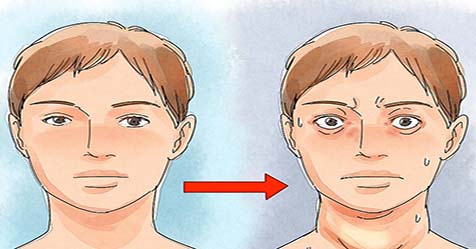Graves’ Disease Causes, Symptoms, and Treatments
Graves' disease is one of immune system disorder in the body which is a common cause of hyperthyroidism, an excessive production of thyroid hormone. Graves’ disease is most commonly experienced by women before the age of 40 years, although it can also attack anyone at any age. This autoimmune disease works by making the immune system secrete antibodies that act like thyroid-stimulating hormones (TSH), which then trigger hormone secretion in the thyroid.
 |
| Graves' disease |
Graves’ disease Causes
The Graves' disease is caused by disruption of the body's immune system function. In this condition, antibodies that produced by the body that should be directed to viruses or other radical things as the trigger of a disease attack the receptors which are present in the cells of the thyroid gland in the neck. These antibodies then interfere with the production of thyroid hormones. So, the amount becomes excessive and leads to hyperthyroidism. Some risk factors that can also trigger Graves' disease are:
- Gender
- Smoking
- Another immune system disorder
- Stress
- Pregnancy
- Genetic background
Graves’ disease Symptoms
Graves’ disease has numerous symptoms which include the appearance of goiter sleeping problems, heat sensitivity, sudden weight loss, muscle weakness, and infertility. Two of the most well-known symptoms of Graves' disease is eye changes and hyperthyroidism. The following are the common symptoms of Graves' disease.
- Weight loss
- Hyperthyroid myopathy
- Difficulty sleeping
- Erectile dysfunction and low sex drive
- Depression and restless
- Enlarged thyroid gland
- The protruding eye (exophthalmos) and eyes feel dry
- Swollen eyelids
- Sensitive to light
- Eyes flushed
Graves’ disease Treatments
The main goal of Graves' disease treatment is to reduce the excess production of thyroid hormones and their effects on the body not to stop the onset of the disease itself. The conventional treatments may have negative drawbacks.
- Anti-thyroid medications. These drugs work by blocking the iodine use of the thyroid gland. Methimazole and propylthiouracil (PTU) belong to this class of drugs.
- Radioiodine therapy. It shuts down the abnormal cells in the thyroid gland that cause the disease.
- Thyroid surgery. This treatment requires removing the entire thyroid in order to cut your supply of thyroid hormones. The surgery can also damage the vocal chords and the parathyroid.
- Beta-blocking medication. These drugs will block and reduce the effects of excessive thyroid hormone on the body. Propanolol, Metoprolol, Atenolol, and Nadolol belong to this class of drugs.
Instead of immediately seeking conventional treatments, there are some natural treatments that can help treat and improve the condition of patients with this disease.
- Use selenium. Selenium acts as an antioxidant and influences thyroid hormone production by limiting the oxidative stress. You can incorporate selenium into your diet by consuming Brazil nuts, walnuts and cod.
- Add vitamin D3 to your diet. Vitamin D3 helps regulate the immune system and limits inflammatory effects in the body. You can also get vitamin D from fatty fish, like wild-caught Alaskan salmon.
- Supplement with L-carnitine. L-carnitine helps prevent muscle weakness and other symptoms of hyperthyroidism. You can get L-carnitine by eating moderate amounts of grass-fed beef and pastured chicken.
- Use cold compresses on the eyes. For Graves’ ophthalmopathy, putting a cold compress on the eyes can help ease the inflammation.